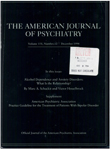Can mildly depressed outpatients with atypical depression benefit from antidepressants?
Abstract
OBJECTIVE: The authors' goal was to explore the efficacy of antidepressant medications in outpatients with mild depression. METHOD: Four hundred one outpatients were diagnosed as depressed by DSM-III criteria. Atypical Depression Diagnostic Scale criteria were also applied to these patients; these criteria require reactivity of mood plus two of four associated features, including hypersomnia, hyperphagia, leaden paralysis, and pathological sensitivity to rejection. All patients were then randomly treated for 6 weeks with up to 300 mg/day of imipramine, up to 90 mg/day of phenelzine, or placebo. Outcome at 6 weeks was determined by clinical global improvement ratings. The outcomes of patients with entry Hamilton Rating Scale for Depression scores in the low (scores of 12 or lower), medium (scores of 13-15), and high (scores above 16) range were compared. RESULTS: The majority (N = 332, 83%) of the 401 depressed patients had definite or probable atypical depression. Among the 140 patients who had low pretreatment Hamilton scale scores, 19 (33%) of 57 given placebo, 25 (60%) of 42 given imipramine, and 34 (83%) of 41 given phenelzine responded. Each of the antidepressants was superior to placebo. Similar findings applied to the patients with medium and high Hamilton scale scores, except that the rates of placebo response were lower (29% and 10%, respectively). CONCLUSIONS: These data support the use of antidepressant medication for some mildly depressed patients, at least if they have atypical depression. Too few patients were included who did not have atypical depression to draw conclusions about such patients.
Access content
To read the fulltext, please use one of the options below to sign in or purchase access.- Personal login
- Institutional Login
- Sign in via OpenAthens
- Register for access
-
Please login/register if you wish to pair your device and check access availability.
Not a subscriber?
PsychiatryOnline subscription options offer access to the DSM-5 library, books, journals, CME, and patient resources. This all-in-one virtual library provides psychiatrists and mental health professionals with key resources for diagnosis, treatment, research, and professional development.
Need more help? PsychiatryOnline Customer Service may be reached by emailing [email protected] or by calling 800-368-5777 (in the U.S.) or 703-907-7322 (outside the U.S.).



